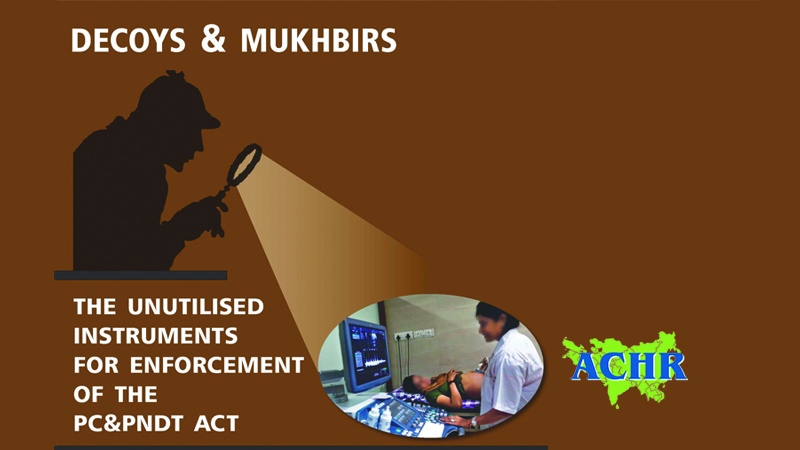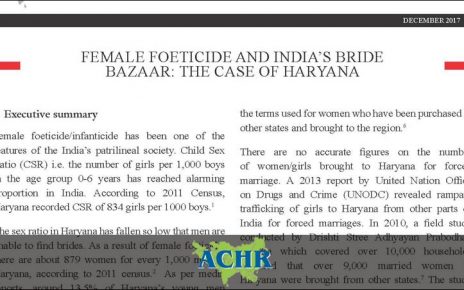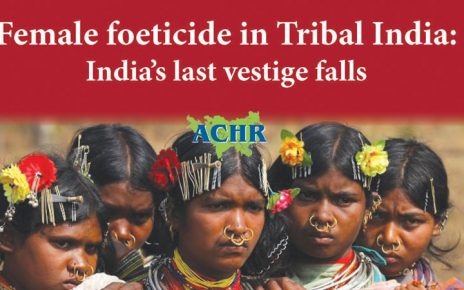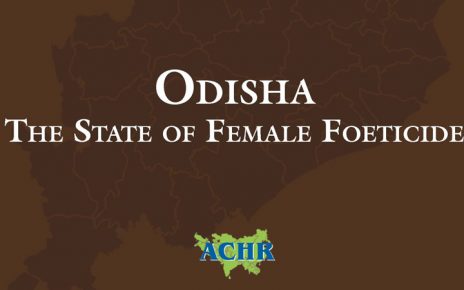India is fighting a losing battle against sex selection because of son preference, dowry, neglect of girl child, higher mortality at younger age, female infanticide, female foeticide etc. According to the estimates of Asian Centre for Human Rights (ACHR), during 1991 to 2011 a total of 250 million girls or 12.5 million girls per year went missing as a result of sex selection.
India enacted the Pre-Conception and Pre-Natal Diagnostic Techniques Act, 1994 (PC&PNDT Act) to address the menace of sex selection leading to female foeticide. However, the enforcement of the PC&PNDT Act remains dismal. That India registered more cases (2,266) of infanticide under Sections 315 and 316 of the Indian Penal Code than cases (2,021) under the PC&PNDT Act4 during 1994-2014 exposes poor implementation of the PC&PNDT Act. After all, violations of the PC&PNDT Act for sex selection (12.5 million missing girls per year) are far more widespread than female infanticide (113 cases per year).
The Appropriate Authorities (AAs) established under Section 17 of the PC&PNDT Act are the authorised bodies to enforce the Act, among others, to nab those conducting sex determination leading to female foeticide. The question is how are the offenders of the PC&PNDT Act to be nabbed?
During inspection under the PC&PNDT Act, the AAs can find out violations such as non registration of genetic counselling centres, genetic laboratories and genetic clinics, non-display of the registration certificate at a prominent place, non-maintenance of the records, non-filling up of the forms etc.
However, it is impossible for the AAs to detect and nab those conducting sex selections during the act without the concerned pregnant woman willing to disclose the crime. Sex selection is conducted with mutual consent of pregnant woman and her family in one hand and medical practitioners /ultrasonologists on the other hand. Therefore, despite millions of sex selection being conducted every year, very few complaints are lodged. Those conducting sex selections can be nabbed only if a pregnant woman is willing to expose the crime by acting as a decoy customer. Therefore, the role of the decoy customers and Mukhbirs i.e. informers to nab the violators of the PC&PNDT Act remains indispensable.
In May 2005, the Ministry of Health and Family Welfare announced its plan to launch sting operations by appointing decoys to nab doctors, medical practitioners and diagnostic centres engaged in female foeticide in the absence of a single conviction till then. The use of decoys for sting operations was recommended by the National Inspection and Monitoring Committee under the PC&PNDT Act in its 2006 Annual Report. The erstwhile Planning Commission too recommended the use of decoys for sting operations in its 12th Five Year Plan (2012-2017). The Beti Bachao Beti Padao (BBBP) scheme launched in 2015 in its guidelines also directed to “institute Rewards for the informers to help in identify the unregistered/ illegal ultrasound machines and the clinics indulging in illegal practice of sex selection” and the reporting template under the BBBP provides for reporting on the number of rewards given to informers. In April 2016, the Ministry of Health & Family Welfare of the Government of India issued “Standard Operating Guidelines for District Appropriate Authorities” which inter alia includes Guidelines for Conducting a Decoy Operation along with Sample Format for Undertaking from Pregnant Woman Acting as Decoy and Sample Format of Panchnama Concerning a Decoy Operation.
Yet, neither the role of the decoys and Mukhbirs has formally been recognised under the PC&PDNT Act and the PC&PNDT Rules nor has any national scheme for protecting and rewarding the decoys and Mukhbirs been launched by the Government of India. A few State Governments have launched dedicated telephone help lines, websites and cash rewards for reporting illegal sex determination and female foeticide. With the exception of the Mukhbir Yojana of Rajasthan, the initiatives of other State Governments remain adhoc, unorganised, unstructured and without any or adequate financial and human resources.
The shortcomings of the schemes on telephone help lines, websites and cash rewards for reporting illegal sex determination and female foeticide being implemented by various State Governments are highlighted below:
First, there are no dedicated staffs to ensure proper implementation of the schemes. Rajasthan is the only State which has established PC&PNDT Bureau of Investigation and the Commissioner of Health of Gujarat informed the Comptroller and Auditor General of India in November 2014 that successful sting operations could not be carried out among others because of “non-availability of dedicated staff to undertake sting operation.”
Second, publicity and awareness campaigns about the dedicated telephone help lines, websites and cash rewards for reporting cases of illegal sex determination and female foeticide have been extremely limited, leading to failure of the schemes. Indeed, Secretary to the Health Department, Government of Madhya Pradesh in its letter dated 15.11.2016 to all District Magistrates of the State acknowledged the lack of awareness about its complaint scheme.
Third, the number of sting operations conducted using decoy customers and Mukhbirs have been very few vis-a-vis magnitude of sex selection i.e. about 12.5 million girls missing every year. Though sting operations are not indicative of successful detection of the violations of the PC&PNDT Act, as per information collated in this report, in Rajasthan, 31 Mukhbirs were awarded for providing accurate information on sex selection while 52 decoy operations were conducted as on 20.12.2016; in Maharashtra, 67 sting operations by involving decoy clients were conducted as on 31.12.2013; in Haryana eight decoys were awarded as of 2012; in Tamil Nadu, one decoy operation was reported in 2016; in Gujarat, 14 successful decoy operations were conducted as of October 2014; in Punjab, two decoy operations were conducted in 2016; in Odisha only one decoy operation was conducted in September 2012; in Madhya Pradesh only two informers were rewarded as on 19.01.2016; in Uttar Pradesh 52 decoy operations were undertaken in 52 USG by 31.03.2015; in Jammu and Kashmir, only one decoy operation was conducted in 2011; and in Andhra Pradesh about 173 decoy operations were conducted by March 2013.
Fourth, the schemes for dedicated telephone help lines, websites and cash rewards for reporting cases of illegal sex determination and female foeticide do not address circumstances which turn the witnesses hostile including intimidation or reprisal faced by the decoy customers or Mukhbirs for approaching the AAs including counter-cases filed against the decoy customers or Mukhbirs.
Fifth, monetary reward of as low as Rs. 5,000 offered by Government of Odisha is not attractive enough considering the risks involved in conducting sting operations to nab those conducting sex determination or female foeticide. It is stated that Rs. 5,000 may not be adequate to cover the travel costs to appear in the proceedings before the courts which are plagued by judicial delay. Though the Government of Odisha admitted that “the money offered is negligible and this turns away most volunteers,” instead of increasing the reward money, the Government of Odisha altogether abandoned the programme on sting operations involving the decoys!
Sixth, most State Governments do not have specific budgetary allocations for the decoys and Mukhbirs. Some State Governments made very meagre allocations. The Government of Odisha allocated Rs 40,000 for the Financial Year 2012-13 i.e. total eight sting operations at the rate of Rs 5,000 per sting operation.
Seventh, with the exception of Rajasthan, none of the State governments has made any scheme for ensuring retention of yet-to-born baby of the pregnant woman participating in a decoy operation. In 2015, Rajasthan reportedly revised its Mukhbir Scheme to provide that “provisions should be made to give an insurance policy to the yet-to-born baby of the pregnant woman participating in a decoy operation”
Eighth, the sting operations using decoys have failed as the Appropriate Authorities in certain States like Andhra Pradesh16 and Tamil Nadu17 announced in advance in which districts sting operations would be conducted and consequently no sex determination and/or sex selection could be detected during subsequent sting operations as potential violators of the PC&PNDT Act were alerted in advance.
Ninth, there is no specific time frame for the AAs to take actions on the complaints/information received by the AAs against sex selection. There are also no complaint mechanisms against the AAs who can act as law unto themselves with respect to complaints or information submitted as no court shall take cognizance of an offence under the PC&PNDT Act except on a complaint made by the Appropriate Authority concerned, or any officer authorised in this behalf by the Central Government or State Government, as the case may be as per Section 28(1)(a). The courts can take cognizance only if the AAs fail to take action in not less than fifteen days. There have been numerous cases of unscrupulous AAs alerting the doctors, sonologists, diagnostic centres etc before the inspection. This not only aborted the sting operations but left the decoys and Mukhbirs at risks including for counter-prosecution from the doctors, sonologists, diagnostic centres etc. The PC&PNDT Amendment Rules dated 24.02.2014 which outlined the code of conduct for the authorities under the PC&PNDT Act do not have any mechanism to establish accountability of the AAs.
Tenth, the decoy and Mukhbir schemes do not address judicial delay and problems faced by them during the trials including no assistance to attend each hearing. It is pertinent to mention that 137 convictions during 2013 and 111 convictions during 2015 took place only after the directions of the Supreme Court on 4 March 2013 in Voluntary Health Association of Punjab vs. Union of India & Ors to take steps to dispose of all pending cases under the PC&PNDT Act within a period of six months. Otherwise, the trials of the cases were caught in judicial delay.
A number of State Governments have suggested extreme measures to combat the scourge of sex selection. The Government of Madhya Pradesh had suggested invoking the National Security Act against those indulging in sex determination and foeticide while the Government of Maharashtra sought opinion from the Union of India whether to invoke provisions of the Indian Penal Code relating homicide and death penalty. Yet, most State Governments have not focused on the most basic issue: the need for streamlining and strengthening the role of the decoys and Mukhbirs without whom the PC&PNDT Act cannot be effectively enforced.
The experiences on the enforcement of the PC&PNDT Act are indeed instructive on the need for streamlining and strengthening the role of the decoys and Mukhbirs. In the first 11 years i.e. till 2005, not a single conviction under the Act could be secured. Between 2005 and 2009, only 26 convictions were secured while another 265 convictions were secured between 2009 and 2015 i.e. 291 convictions as on 31.12.2015 as given in Table 2. Out of the total 291 convictions, 248 convictions or 85% of the convictions took place during 2013 (137) and 2015 (111) after the Supreme Court directed on 4 March 2013 in Voluntary Health Association of Punjab vs. Union of India & Ors, among others, to various courts in the country through the Registrars of various High Courts to “take steps to dispose of all pending cases under the Act, within a period of six months”. Furthermore, a total of 224 convictions i.e. 77% of the total convictions took place in Rajasthan (85), followed by Maharashtra (76) and Haryana (63). It is not a mere co-incidence: Rajasthan, Maharashtra and Haryana are the only States which have been using decoy customers and Mukhbirs and rewarding them substantively.
On the basis of the analysis of the existing schemes of various State Governments for the decoys and Mukhbirs, Asian Centre for Human Rights recommends the following to the Government of India and various State Governments:
1. Launch a “National Decoy & Mukhbir Yojana” for implementation of the PC&PNDT Act, which shall, inter alia,
- fix uniform amount of rewards of at least Rs 200,000 to decoys and Mukhbirs as being provided in Rajasthan, to be implemented in all the States and the Union Territories (UTs);
- provide specific incentive in the form of bond/scheme for the unborn baby of the decoy customer25 apart from undertaking of not aborting the foetus under any circumstances;
- provide specific allowance to attend each hearing during the trials;
- ensure anonymity of the complainants, informers etc to the extent possible;26 and
- sanction adequate financial resources for implementation of the scheme in all the States and UTs;
2. Amend the PC&PNDT Rules, among others, to provide that
- Each State or UT shall have centralised and/or district specific dedicated telephone help lines, email and online format for filing of complaints to the Appropriate Authorities;
- Information/complaints received by the Appropriate Authorities shall be communicated to the Central Supervisory Board, National Inspection and Monitoring Committee, State Supervisory Board and State Inspection and Monitoring Committee within 24 hours and that the failure to inform within 24 hours by the Appropriate Authorities shall lead to a presumption “that there was an attempt to suppress the incident”27 and warrant departmental inquiries and necessary actions against the concerned AAs;
- Investigation into the complaints/information received shall be completed within 15 days by the Appropriate Authorities;
- Findings of the investigation by the AAs and action taken reports shall be communicated to the Central Supervisory Board, National Inspection and Monitoring Committee, State Supervisory Board within 21 days i.e. within one week after the completion of investigation;
- All information shall be submitted in each quarterly report under the PC&PNDT Act and the same shall be put up on the website of the PC&PNDT Department of each State and UT and the Ministry of Health and Family Welfare, Government of India;
- Hospitals/nursing homes/ centres etc having equipment capable of sex selection shall display prominently on its premises with texts in English, Hindi and the local language saying, “Sting operations to expose those disclosing sex of the foetus is rewarded with Rs (amount) and for the reward, the evidence/information can be communicated to designated phone number, email or website”; and
No suit, prosecution or other legal proceedings shall lie against any decoy customer and her associates and the Mukhbirs for providing information/complaint about the violations of the PC&PNDT Act in good faith.




